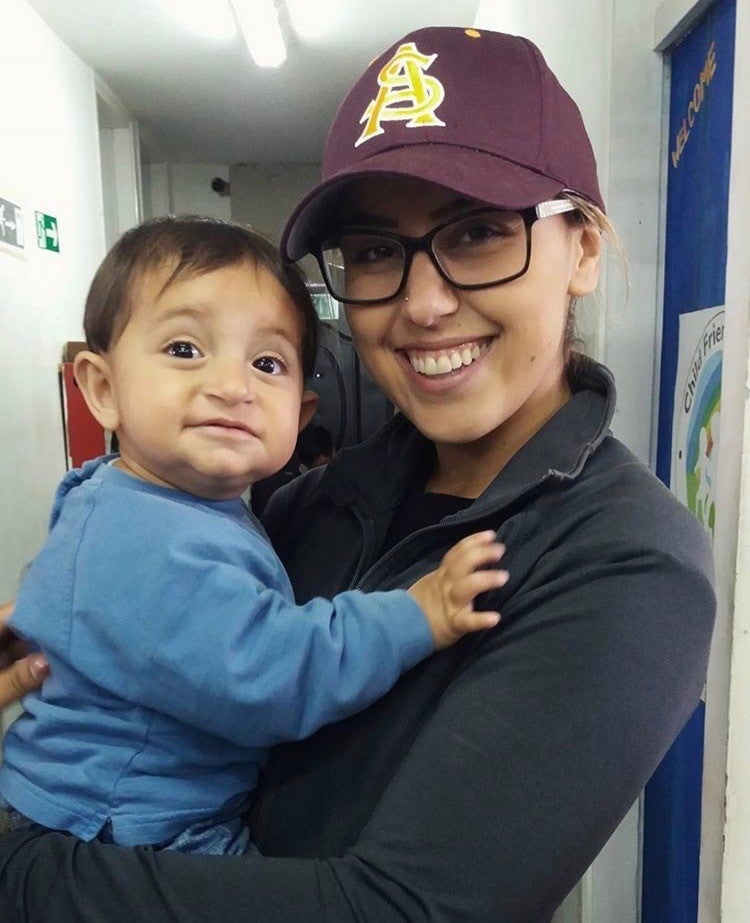ASU student blogs 'through the eyes of a refugee'

A spray-painted wall that lined the "barracks" where refuges lived.
Change isn’t always grand or sweeping. Sometimes something as simple as a blog, can open people’s eyes to a global issue that needs our attention.
For Arizona State University global studies major Natalija Staletovic, this is where she started.
Every year, global studies majors within ASU's School of Politics and Global Studies enroll in the Global Experience program. Staletovic is one such student, and in early 2017, she earned the internship of a lifetime: working with UN Women in Belgrade, Serbia.
Staletovic began her work in the United Nations House in Belgrade. After becoming acquainted with her supervisor and coworkers, she was given several folders filled with documents on the UN’s mission in Belgrade and its goals for the refugees who stayed in the camps there.
She remarked that, while she understood that women and girls face much abuse, the statistics shocked her. Staletovic decided to dedicate her time with the UN towards serving women and girls who had become victims of violence in the region and abroad.
Once she had familiarized herself with the statistics, Staletovic began working with female refugees in the camp, engaging with them in the “Women’s Corner” where they made crafts. She also taught some English classes, and in general communicated with those who knew some Serbian or English. From them she heard — and in some cases, saw — the abuse they had suffered and baggage they carried with them as a result. Staletovic said none of the statistics did justice to the personal and horrific experiences these women had faced.
Natalija Staletovic
After working for the UN for some time, Staletovic began a blog titled “Through The Eyes Of A Refugee” on Tumblr. The original purpose of the blog was of a personal nature; hearing the stories first-hand from men and women who had suffered so much, Staletovic was moved, coming to the conclusion that it was necessary for their stories to be shared with the world. In a style reminiscent of Humans of New York, a popular blog also started on Tumblr, Staletovic began to record the experiences of the many refugees stuck in Serbia.
A common theme found throughout the refugees’ stories is hope in the face of all odds and the endurance of the human spirit. One story follows a young man whose name is redacted at his request; he is referred to as “Dglesh,” which means “Flash Fire” in the Kurdish language. He spoke of starting work at only eight years old, helping the family make ends-meet until he fled to Iraq at the age of thirteen to make more money for his family. The way in which Staletovic describes the young man’s battles with depression and suicidal thoughts, to eventually having dreams of reaching Germany, are uplifting.
Staletovic explored the humanity of the refugees and what could be characterized as “frustrated desperation.” Her blog features images and a video from a bundle of abandoned warehouses commonly known as “the barracks.” Here, young men make home as they prepare to illegally enter other nations which are known for being extremely hostile to refuges such as Hungary.
The barracks are filled with “tents, makeshift beds, and smoke from fires of the food cooking.” Amidst the “unhygienic conditions” are spray-painted walls, home to pleas for help and reminders of their humanity; one reads, “Refugees are Not terrorists,” while another, in bright orange, states “Please Help Us.” It is a stark reminder of their fate and the horrific conditions they face, conditions easily forgotten when thousands of miles away.
Staletovic’s supervisors saw her blog as a unique project; it became her main project for UN Women, and was eventually shared by UN Women Serbia and plans to be shared by the UN Women Europe and Central Asia website.
By May 31, she had finished her project and ended her internship with UN Women. However, that does not mean she is done. Staletovic hopes to one day return and work again with the UN House, possibly even working with the United Nations Development Programs (UNDP) in Syria.
“Even if [I] made an inch of a difference to the world, at least it was an inch and its one inch closer to making this world a better place,” Staletovic said. “The world won’t change overnight; it’s going to take a lot of time and a lot of patience.”
More Law, journalism and politics

TechTainment conference explores the crossroads of law, technology, entertainment
What protections do writers, actors, producers and others have from AI? Will changing laws around name, image and likeness (…

How to watch an election
Every election night, adrenaline pumps through newsrooms across the country as journalists take the pulse of democracy. We…
Law experts, students gather to celebrate ASU Indian Legal Program
Although she's achieved much in Washington, D.C., Mikaela Bledsoe Downes’ education is bringing her closer to her intended…
